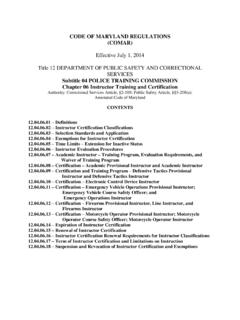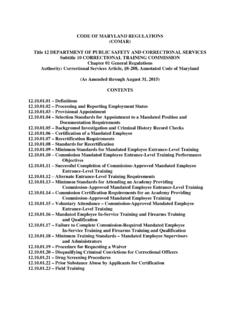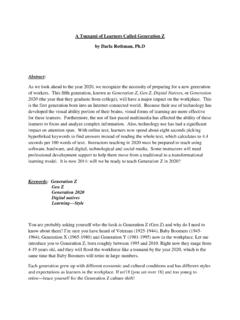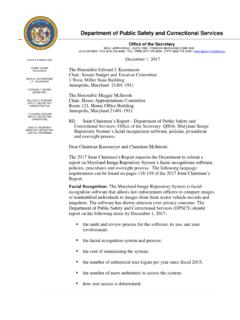Transcription of MARYLAND POLICE AND CORRECTIONAL …
1 MARYLAND POLICE AND CORRECTIONAL training COMMISSIONS LEGISLATIVE AND REGULATORY HISTORY POLICE training commission (Through 10/1/06) TABLE OF CONTENTS Introduction .. 1 Legislative History .. 2 History of Regulations by Category: Certification/Probationary 5 Entrance-Level 7 Firearms/Certified Firearms Safety 11 In-Service training .. 12 Instructors .. 13 Selection Standards .. 15 Supervisor and Administrator training .. 19 Chronological Listing of POLICE Laws and Regulations.
2 20 INTRODUCTION In 1966, the MARYLAND General Assembly passed legislation to create the POLICE training commission to regulate training of law enforcement agencies and certify compliance by POLICE officers, instructors and training academies. The legislation signed the bill into law on April 22, 1966. MARYLAND became the twenty-third state to establish stateside criteria for the training of State and Local law enforcement officers, and the sixth state to make compliance mandatory. The POLICE training commission sets minimum standards for entrance level and annual training of law enforcement officers, certifies officers who have successfully completed entrance level training , recertifies officers who have kept their training current, sets minimum standards for instructors and training academies, and certifies instructors and academies which meet those standards.
3 The commission also provides free training to citizens wishing to obtain firearms. The POLICE training and CORRECTIONAL training Commissions, a State agency under an Executive Director, provides administrative support, drafts regulations, directs regulatory enforcement efforts, offers crime prevention services and coordinates and conducts training for the POLICE training commission , as it also does for the CORRECTIONAL training commission . This document contains laws that were effective on 10/1/06 and regulations that became effective through September 12, 2005 Reghistory-ptc-1005 Francis Manear 8/16/05 1 LEGISLATIVE HISTORY OF POLICE training commission 6/1/66 - The POLICE training commission was established by MARYLAND General Assembly (Article 41, Section 4-201, Annotated Code of MARYLAND ).
4 Duties of the commission include: (1) Setting minimum standards for entrance level and annual in-service training ; (2) Prescribing curricula, minimum courses of study, attendance requirements and minimum standards for POLICE training academies; (3) Approving POLICE training academies, and issue them certificates of approval; (4) Adopting minimum qualifications for instructor certification; (5) Issuing certificates to POLICE officers who satisfactorily complete training requirements, and to issue tri-annual renewals; (6) Making such rules and regulations as is necessary to accomplish the purposes and objectives of the law.
5 6/1/71 - Legislation was passed to: (1) Empower commission to set selection standards for law enforcement officers, effective 7/1/72. (2) Include public security officers under the commission 's mandate. (3) Authorize the commission to set standards of training for promotion, including entrance level for supervision and administration. 7/1/74 - Members of sheriffs offices are included under the Commissions' mandate by the MARYLAND General Assembly. 7/1/75 - The definition of Security Officer was clarified. 7/1/76 - Sheriff's departments are included in the definition of law enforcement agencies.
6 7/1/76 - The commission is authorized to conduct and operate approved POLICE training schools. 7/1/77 - Courses on rape and sexual offenses are required in entry-level and in-service curricula. 1/1/82 - Amendments to the law: (1) Authorized the commission to certify, recertify, revoke or suspend certification of POLICE officers; (2) Provided for an automatic lapse of certification after three years; and (3) Set procedures for the recall of certificates, including a hearing and review procedure for due process of law. 27/1/84 - A new requirement was added mandating that once every three years in-service curricula contain courses on the handling of victims of rape and sexual offenses, including subject matter on the sexual abuse of children.
7 7/1/85 - The definition of POLICE officer was amended, the definition of security officer deleted, and certain persons were exempted from the definition of who may be certified under certain conditions. 7/1/86 - Members of the Alcohol and Tobacco Tax Enforcement Unit were added to the listing as POLICE officers, requiring them to meet the commission 's selection and training standards. 6/12/88 (1) The Law Enforcement and CORRECTIONAL training Fund was created, the exclusive purpose of which is to fund the construction of a Public Safety training Center. Funds collected after 6/30/93 will be credited to the General Fund.
8 (2) "Non-full-time" officers are exempted from the commission 's mandate if a POLICE department employs more than 70 full-time officers and at least 100 non-full-time officers. Non-full-time officers were defined as persons not employed as a POLICE officer for at least seven months in a calendar year. 7/1/90 - A Home Detention Program was authorized, providing certain CORRECTIONAL employees in this program to have limited search and arrest powers, and requiring completion of a training program approved by the POLICE training commission . 7/1/91 - The Housing Authority of Baltimore City POLICE Force is added as a law enforcement unit mandating them to meet certification requirements of the POLICE training commission .
9 6/1/92 - A Home Detention program is authorized for the Division of Parole and Probation, mandating that specified employees of this program receive training approved by the POLICE training commission . 10/1/93 - The Baltimore City School POLICE were added as a law enforcement unit, mandated to meet certification requirements of the commission and no longer required to obtain a Special POLICE commission . 10/1/94 - The Crofton POLICE Department is added as a law enforcement unit and mandated to meet certification requirements of the POLICE training commission . 10/1/97 - The commission is authorized to adopt regulations establishing and enforcing standards for prior substance abuse for applicants for POLICE officer certification.
10 10/1/98 - The Office of the State Fire Marshall is included in the law as a law enforcement unit, mandating that designated deputy fire marshals become certified and meet the standards of the commission . 10/1/99 - The Internal Investigation Unit of the Department of Public Safety and CORRECTIONAL Services is included in the law as a law enforcement unit, conferring POLICE powers on their investigators and mandating them to meet the standards of the commission and become certified. 310/1/00 - Amendments were made to the law to: (1) Have the commission develop and offer firearms safety courses (beginning 1/1/02) throughout MARYLAND at no cost to all citizens applying for handgun licenses; and (2) Add the Department of Labor, Licensing and Regulations POLICE Force to the listing of agencies required to meet the commission s standards.















